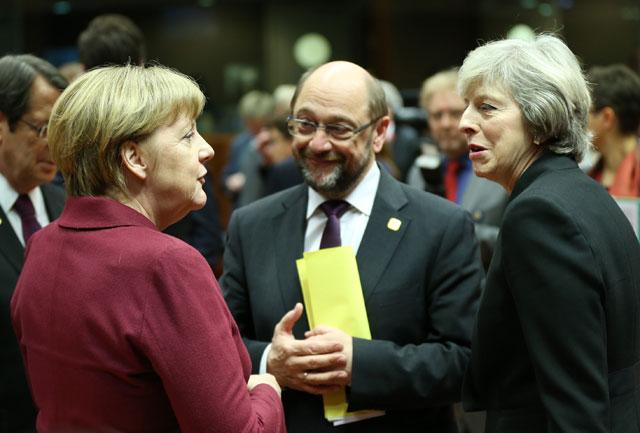You are here
Eurosceptics hail victory after Dutch ‘No’ vote on EU-Kiev deal
By AFP - Apr 07,2016 - Last updated at Apr 07,2016

GeenPeil frontman Jan Roos, initiator of the Dutch referendum on the EU's treaty of association with Ukraine, follows the outcome of the referendum in Amsterdam on Wednesday (AFP photo)
THE HAGUE — The Dutch "No" to an EU pact with Ukraine dealt a fresh blow to European unity Thursday, handing eurosceptics a symbolic victory ahead of Britain's in-out referendum in June.
European leaders were licking their wounds after preliminary results showed that over 61 per cent of those who voted were opposed to the Brussels-Kiev agreement in what was seen as a wider barometer of anti-EU feeling.
"The 'No' camp clearly won," Dutch Prime Minister Mark Rutte — whose country currently holds the rotating EU presidency — said late Wednesday.
Ukraine itself vowed the results would not be an obstacle to its push for closer ties with the 28-member European Union away from the orbit of former Soviet master Russia.
But European Commission head Jean-Claude Juncker, who had warned ahead of the referendum a "No" could open the doors to "a "continental crisis", was said to be saddened by the outcome.
The bloc is already battling deep divisions over its handling of the continent's biggest migration crisis since World War II and financial meltdowns in several member countries including Greece.
British Prime Minister David Cameron nevertheless voiced hope the vote would not boost the campaign for Britain to leave the bloc in the June 23 referendum.
"It is important that the European institutions and the Dutch government listen carefully to what people are saying, to try and understand that and to try and work with that," Cameron said.
But he added: "I don't think it has any effect on us because we have a bigger question."
However, Nigel Farage, leader of the anti-EU UK Independence Party, hailed it as a "tremendous victory for democracy".
"Time and again, voters are choosing to reject Brussels whenever they are consulted about the EU," added Matthew Elliott, chief executive of Vote Leave, another pro-Brexit group.
The Dutch referendum, organised by eurosceptic groups, was seen as an embarrassment for Rutte's coalition government, which backed a "Yes" vote, and leaves it with a dilemma of what to do next.
Dutch news agency ANP projected that while only 32 per cent of the electorate had cast their ballot, it was enough to ensure the non-binding referendum is valid and must be considered by the government.
"We are now going to look at the process step-by-step," Rutte said, adding a final decision on what to do "may still take weeks".
Facing a fresh headache on the bloc's legitimacy, EU President Donald Tusk said he would be in contact with Rutte.
"I need to hear what conclusions he and his government will draw from the referendum and what his intentions will be," Tusk said.
Rutte "is in a tricky situation", said political analyst Claes de Vreese.
"He will now quickly have to figure out what the biggest gripes are of those who voted no and see if he can do something about it in Brussels,” De Vreese told AFP.
"Eurosceptics will of course use this as an example of growing discord over the European Union," De Vreese added.
But he and other analysts warned that given the low turnout, the "No" vote was not representative of all 12.5 million eligible voters.
The Netherlands is now the only member in the 28-nation EU not to have ratified the association agreement with Ukraine, which has already been given the thumbs up by both houses of the Dutch parliament.
Ukrainian President Petro Porosheko said the Dutch vote was not a "strategic obstacle" on the path to closer ties to Europe.
"We will not turn off the road of European integration. Ukraine and freedom cannot be stopped," he said, adding that the vote appeared largely directed against the EU itself.
"This is an attack on the unity of Europe, an attack on the spread of European values."
EU officials noted that in any case, the two-year-old treaty, which mainly deals with boosting trade, has already gone into force provisionally.
But Russian leaders gloated at the "No" vote.
"Results of the Dutch referendum on the EU-Ukraine association agreement indicate Europeans' opinion of the Ukrainian political system," Prime Minister Dmitry Medvedev tweeted.
Related Articles
LONDON — Britain's prime minister appealed to doubters at home and in other EU capitals on Tuesday to back his attempt to reform the 28-memb
THE HAGUE — Flamboyant Dutch populist Thierry Baudet is set to make major inroads on Thursday at European parliamentary elections, in a resu
BRUSSELS — European Union leaders grappled with Russia and Brexit at a "minefield" summit in Brussels on Thursday at the end of one of the m














